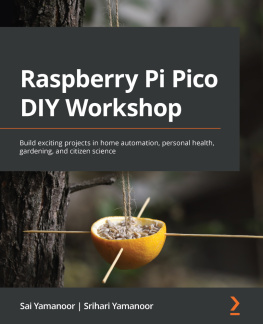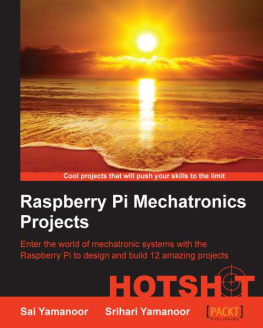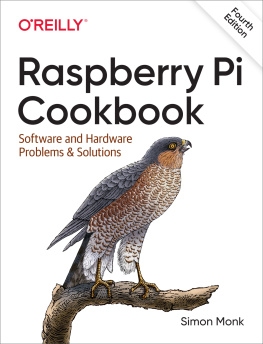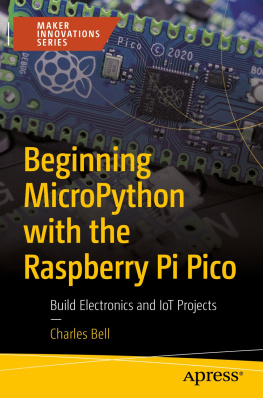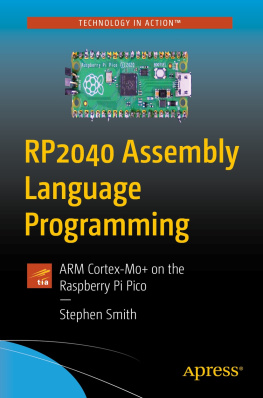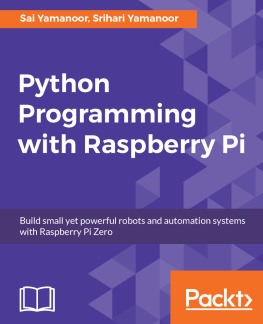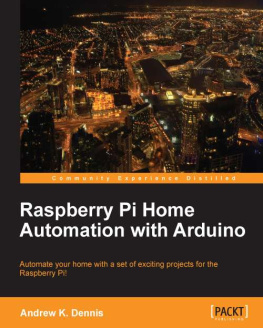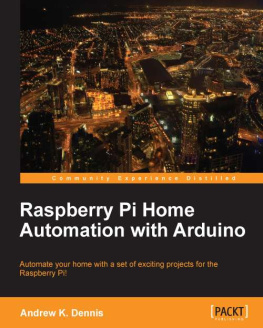Sai Yamanoor - Raspberry Pi Pico DIY Workshop: Build exciting projects in home automation, personal health, gardening, and citizen science
Here you can read online Sai Yamanoor - Raspberry Pi Pico DIY Workshop: Build exciting projects in home automation, personal health, gardening, and citizen science full text of the book (entire story) in english for free. Download pdf and epub, get meaning, cover and reviews about this ebook. year: 2022, publisher: Packt Publishing, genre: Home and family. Description of the work, (preface) as well as reviews are available. Best literature library LitArk.com created for fans of good reading and offers a wide selection of genres:
Romance novel
Science fiction
Adventure
Detective
Science
History
Home and family
Prose
Art
Politics
Computer
Non-fiction
Religion
Business
Children
Humor
Choose a favorite category and find really read worthwhile books. Enjoy immersion in the world of imagination, feel the emotions of the characters or learn something new for yourself, make an fascinating discovery.
- Book:Raspberry Pi Pico DIY Workshop: Build exciting projects in home automation, personal health, gardening, and citizen science
- Author:
- Publisher:Packt Publishing
- Genre:
- Year:2022
- Rating:3 / 5
- Favourites:Add to favourites
- Your mark:
Raspberry Pi Pico DIY Workshop: Build exciting projects in home automation, personal health, gardening, and citizen science: summary, description and annotation
We offer to read an annotation, description, summary or preface (depends on what the author of the book "Raspberry Pi Pico DIY Workshop: Build exciting projects in home automation, personal health, gardening, and citizen science" wrote himself). If you haven't found the necessary information about the book — write in the comments, we will try to find it.
Take your first steps with the Raspberry Pi Pico and take on exciting projects using CircuitPython, MicroPython, and Pico
Key Features- Make the most of the Raspberry Pi Picoa low-cost microcontroller that is primed for innovation
- Work with easy-to-follow examples and learn how to interface and program a Raspberry Pi Pico
- Work on fun projects, right from home automation to building a seven-segment display to tracking air quality
The Raspberry Pi Pico is the latest addition to the Raspberry Pi family of products. Introduced by the Raspberry Pi Foundation, based on their RP2040 chip, it is a tiny, fast microcontroller that packs enough punch to power an extensive range of applications. Raspberry Pi Pico DIY Workshop will help you get started with your own Pico and leverage its features to develop innovative products.
This book begins with an introduction to the Raspberry Pi Pico, giving you a thorough understanding of the RP2040s peripherals and different development boards for the Pico designed and manufactured by various organizations. Youll explore add-on hardware and programming language options available for the Pico. Next, youll focus on practical skills, starting with a simple LED blinking project and building up to a giant seven-segment display, while working with application examples such as citizen science displays, digital health, and robots. Youll also work on exciting projects around gardening, building a weather station, tracking air quality, hacking your personal health, and building a robot, along with discovering tips and tricks to give you the confidence needed to make the best use of RP2040.
By the end of this Raspberry Pi book, youll have built a solid foundation in product development using the RP2040, acquired a skillset crucial for embedded device development, and have a robot that you built yourself.
What you will learn- Understand the RP2040s peripherals and apply them in the real world
- Find out about the programming languages that can be used to program the RP2040
- Delve into the applications of serial interfaces available on the Pico
- Discover add-on hardware available for the RP2040
- Explore different development board variants for the Raspberry Pi Pico
- Discover tips and tricks for seamless product development with the Pico
This book is for students, teachers, engineers, scientists, artists, and tech enthusiasts who want to develop embedded systems that drive cost-effective automation, IoT, robotics, medical devices, and art projects. If you consider yourself a maker and would like to learn how to use the Raspberry Pi Pico, then this book is for you. Familiarity with Python programming, MicroPython, CircuitPython, embedded hardware, and peripherals is helpful but not mandatory to get the most out of this book.
Table of Contents- Getting Started with the Raspberry Pi Pico
- Serial Interfaces and Applications
- Home Automation Projects
- Fun with Gardening!
- Building a Weather Station
- Designing a Giant Seven-Segment Display
- Designing a Visual Aid for Tracking Air Quality
- Building Wireless Nodes
- Lets Build a Robot!
- Designing TinyML Applications
- Lets Build a Product!
- Best Practices for Working with the Pico
Sai Yamanoor: author's other books
Who wrote Raspberry Pi Pico DIY Workshop: Build exciting projects in home automation, personal health, gardening, and citizen science? Find out the surname, the name of the author of the book and a list of all author's works by series.

